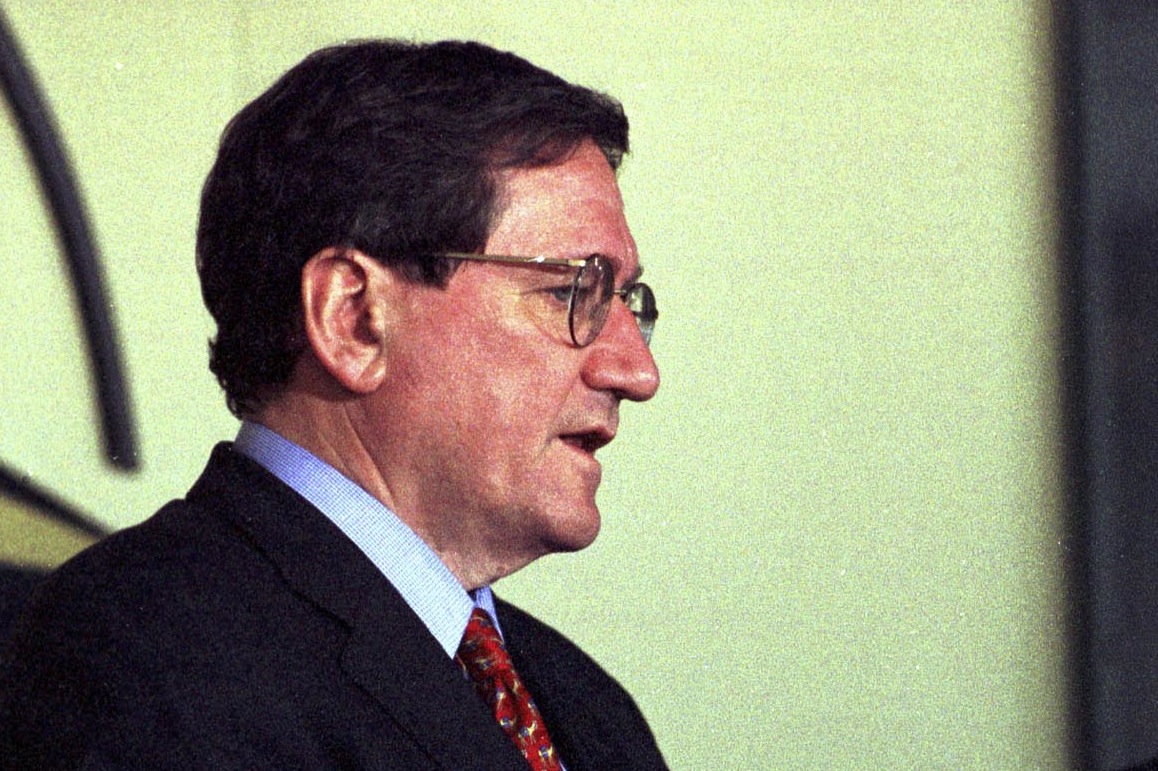Holbrooke Emerges as Power Center at State
Richard Holbrooke, a longtime diplomat, has reconfigured the State Department’s South and Central Asia bureau.
Jul 31, 20204.9K Shares411.9K Views
Richard Holbrooke (NATO photo)
A year ago, when Barack Obama clinched the Democratic presidential nomination, it looked as if Hillary Rodham Clinton wasn’t the only one whose ambitions were dashed. Richard Holbrooke, the longtime diplomat who was likely to be secretary of state if Al Gore or Sen. John Kerry (D-Mass.) had won the presidency, had few ties to the Obama campaign and had thrown his lot in with Clinton. Younger progressive foreign policy experts who bridled at Holbrooke’s support for the Iraq war were generally pleased.
Illustration by: Matt Mahurin
Today, with Clinton as President Obama’s secretary of state, Holbrooke has emerged as one of the most powerful forces in the administration’s foreign policy team. He will have a hand in crafting policy on many of the administration’s immediate geopolitical priorities, from Afghanistan-Pakistan to Iran. As the special envoy to Afghanistan and Pakistan, and co-chairman of the team planning the administration’s soon-to-be-announced shift in strategy for the Afghanistan war, Holbrooke is present at the creation of what may become the administration’s defining foreign policy venture. Back at the State Department in Washington, a rearrangement of the South and Central Asia bureau has occurred to accommodate his new portfolio. “Holbrooke has taken over the Afghanistan-Pakistan part of the bureau,” said Amb. Ronald Neumann, the U.S. ambassador to Afghanistan from 2005 to 2007, in line with the far-reaching mandategiven to him by Obama and Clinton when his envoyship was announced in January.
It’s not just Afghanistan and Pakistan. Earlier this month, Clinton publicly invitedIran to an international conference on stability in Afghanistan, a move first hinted at in February, when The Wall Street Journal reportedthat Holbrooke would test Iranian willingness to help Afghanistan confront its opium problem. If the Iranians attend the United Nations-sponsored conference, scheduled for March 31 at The Hague, which Holbrooke will attend, it would place Holbrooke at the center of the administration’s much-anticipated outreach to a country that hasn’t had formal diplomatic relations with the United States in 30 years.
Additionally, on Wednesday, Christopher Hill, a Holbrooke ally from their days in the 1990s working on the Balkans crisis, went before the Senate Foreign Relations Committee for his nomination hearingto become ambassador to Iraq. Rumors have circulated around Washington that Hill, who has no experience in the Middle East, got the nomination in part because of Holbrooke’s esteem, although some administration officials have downplayed that explanation. Still, while he hasn’t gotten as large a workload as he might like — the Indians successfully lobbiedto get the administration to leave India relations out of what became Holbrooke’s portfolio — Holbrooke has established an arc of influence over much of the Obama administration’s most pressing foreign-policy ventures.
“He is basically a cabinet secretary,” said one progressive Democratic foreign policy expert who requested anonymity. “Once [Obama] appointed Clinton as [secretary of state] it was pretty obvious Holbrooke would have a major role.”
Holbrooke, 67, is widely considered “one of the most talented diplomats of his generation,” as Obama said in January — and not known for accepting minor roles. As a young Foreign Service officer in the early 1960s, Holbrooke served in Vietnam, receiving blunt assessments of a worsening war from the legendary counterinsurgent John Paul Vann and top Saigon reporters like David Halberstam and Neil Sheehan. His star quickly rose in Democratic foreign policy circles: under President Jimmy Carter, he became the then-youngest assistant secretary of state in history, responsible for Asia policy, at age 35. But it was under the Clinton administration that he registered his greatest success, laboriously brokering in 1995 an end to the genocidal war in Bosnia while serving as assistant secretary of state for European affairs. His reward was becoming U.N. ambassador during President Bill Clinton’s second term, his first — and so far only — cabinet-level position. At all times during Republican administrations, Holbrooke has been a prolific op-ed writer, offering public advice on foreign policy and advising liberals and Democrats to pursue an active, interventionist course in foreign affairs.
“I’ve been called a liberal interventionist by some people, and I think there’s some accuracy to that,” Holbrooke said in an interviewwith Der Spiegel in 2007. “I supported intervention in Bosnia and Kosovo, I would support it in Darfur. But we can’t intervene everywhere all the time. But above all, if we intervene, there are two absolutely critical criteria. It should be a collective action with our allies and secondly it should succeed.”
His influence hasn’t come without controversy. Many progressives, even those who concede his diplomatic acumen, are wary of Holbrooke because they consider him too wedded to centrist, establishment foreign policy thinking and too quick to endorse military solutions to foreign policy problems. “You want someone as effective and tenacious as he is on your side,” said the progressive foreign-policy expert. “The problem is he always thought the safe bet was Clinton and the more liberal-hawk perspective.” Some progressives, though, say they’ve been pleased so far with Holbrooke’s early performance as envoy.
In recent days, Holbrooke’s service on the board of the vilified insurance giant AIG and his alleged assuranceto indicted former Bosnian Serb leader Radovan Karadzic that Karadzic wouldn’t face prosecution if he left politics — which Holbrooke categorically denies making — have come under fire in the press.
Despite that, Holbrooke has made for an energetic special envoy for Afghanistan and Pakistan so far, traveling frequently to the region and to NATO capitals. Colleagues in the administration who did not want to be quoted describe him as being simultaneously in information-gathering and policy-formation mode. His global debut as special envoy, made in a speechto the annual Munich security conference in early February, laid out an inclusive tone for administration policy but was careful to avoid making specific policy prescriptions ahead of formal administration decisions. The Obama administration will seek a course of “attainable objectives with adequate resources instead of the reverse,” he said, contrasting its approach with the previous administration’s. He took pains to issue gestures of respect to NATO countries that often feel burdened by the U.S.-led war in Afghanistan — “I would like to thank all the other countries that have risked so much and sacrificed so much,” he began — and focused his remarks on marshaling sustained international support for both Pakistan and Afghanistan, which he described as inextricable.
This weekend, Holbrooke gave foreign allies their first public glimpse of the new administration strategy, but — with one significant exception — still stuck to broad themes. He called the idea that the U.S. might scale back its goals in Afghanistan “journalist gobbledygook,” something that worried senior Afghan officials who visited Washington last month to inform the administration’s strategy review. Instead, Holbrooke pledged an end to what he called an era of “neglect” of the seven-plus-year war, and in its place would come an intensified U.S. commitment — “more troops, more resources, more high-level attention,” he said. Holbrooke did make one declarative statement about forthcoming U.S. policy: while expressing worry about an expanded Taliban hold over western Pakistan, he said that “You can’t send troops into Pakistan. That’s a red line.”
As a special envoy, Holbrooke’s influence is perhaps most directly felt at Foggy Bottom. Holbrooke is not shy about telling staffers at the bureau responsible for South and Central Asia, known as SCA, that his authority steps directly from his relationship with Clinton and Obama, according to people who have been in meetings with him. “Since the job does not have statutory position in the bureau, it had to be explained,” said one. While Holbrooke’s diplomatic cables are written to the secretary of state, “they are seen and cleared by others as appropriate.” Some department veterans noted that the assistant secretary for SCA typically reports to the secretary of state through the undersecretary for political affairs, while Holbrooke will not.
About two weeks ago, Holbrooke installed his deputy, Paul Jones, the former deputy chief of mission at the U.S. embassy in Manila, as deputy assistant secretary for SCA. The bureau is about to experience a changeover in formal leadership: Richard Boucher, the assistant secretary whom the Bush administration appointed to lead the bureau, is expected to leave, and the White House is in the process of vetting Robert Blake, the U.S. ambassador to Sri Lanka, for the job. Yet Jones will remain as deputy for the next assistant secretary while continuing to serve as Holbrooke’s deputy, and Blake’s background in Sri Lanka and India before thatsuggests that a tacit boundary exists between his portfolio and Holbrooke’s. Jones, who will continue to travel abroad with Holbrooke, will ensure that the rest of the bureau will “not get crosswise with Holbrooke” and his control over Afghanistan and Pakistan policy, said Neumann.
“It made sense to dual-hat Jones,” explained a State Department official who described it as a “logical way” to integrate the SCA staff with Holbrooke’s, and not indicative of a turf battle. “Boucher and Holbrooke agreed upon the decision. The secretary of state endorsed it.”
Within SCA, the unusual relationship between the assistant secretary and Holbrooke has led to confusion about the proper reporting channels about diplomatic activity. “There’s a way the State Department works, moving paper around,” said one knowledgeable department official, using a State Department shorthand referring to the transmission of information. “Holbrooke came in, and he wants to do things himself,” the official continued. “Who does the Pakistan desk report to?” Junior officials in Washington tasked with handling the details of policy on Afghanistan and Pakistan are unsure of where to send their reports, or whether they’ll receive reports from Holbrooke during his trips to Afghanistan, Pakistan or to NATO countries to enlist greater support from allied nations. One official said that placing Jones in his dual role as deputy for both Holbrooke and the SCA assistant secretary was “key to getting both halves of the machine integrated.”
Not all State Department officials consider the confusion an insurmountable obstacle. “Holbrooke has his own structure which is being meshed with the State Department structure,” said one. “In a few months, it might be perfect, but right now, it is not.” He is said to have good relations with desk officers in Washington working on Pakistan issues, and often gets information from them directly. Observers noted that a Pakistan desk officer, Shamila Chaudhary, impressed Holbrooke in a briefing soon after his January arrival at the department, and was shortly thereafter promoted to a prestigious job on the department’s policy planning staff, though the decision was made by Anne-Marie Slaughter, the director of policy planning. Diplomatic sources said that Holbrooke has a good working relationship with the director of SCA’s Afghanistan office, Henry Ensher, as well as with the Pakistan desk director, Robert Kemp.
While some progressives are still getting used to Holbrooke, his visible influence on administration policy has yet to attract disfavor. One said that working for a progressive president shifts Holbrooke’s perspective somewhat leftward. “I haven’t really had a problem with what he’s doing,” said the progressive foreign-policy expert. “We’ll have to wait and see what actually comes out” of the new administration strategy on Afghanistan and Pakistan, “but I think they’re heading in a pretty solid direction… I’ve been surprisingly pleased with him.” The expert noted that in 2007 Holbrooke “went to Afghanistan for a month. How many guys on his level have spent a month in Afghanistan?”
Inside the State Department, there is little doubt over Holbrooke’s position as an administration power center. “People want to work for Holbrooke,” said one official. “That’s where the action is.”

Hajra Shannon
Reviewer
Latest Articles
Popular Articles

